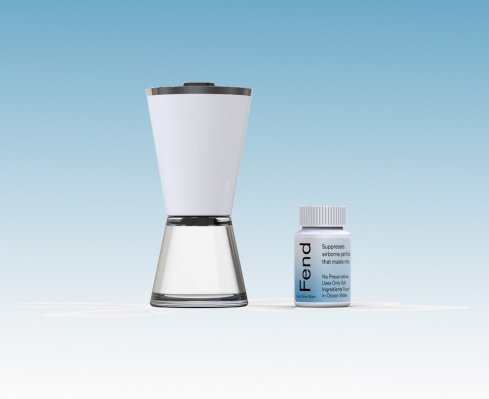A new product developed by Harvard professor of the Pracice of Biomedical Engineering David A. Edwards is set to launch this fall, and claims to be able to provide a nearly 100 percent reduction in the particles present in exhaled air – thus reducing the potential transmission of SARS-CoV-2 both into, and out of, the lungs while breathing. That could mean a significantly reduced risk of contracting COVID-19, particularly for frontline healthcare workers when used in combination with other PPE like face masks.
The product, called FEND, and produced by Edwards’ tech startup Sensory Cloud, is set to be available from September. It’s a saline mixture (essentially a “salty mist”) that contains no drugs, and is instead directed from naturally-occurring salts that are most often found in sea water. The mist, when delivered via deep nasal inhalation in misted form, has been shown in peer-reviewed research published on Tuesday by Sensory Cloud in medical journal QRB Discovery to clean upper human airways of particles that are less than a micron in size that aren’t typically filtered out by most conventional mask designs.
The study conducted by the company is based on a small-scale sample population of 10 volunteers, including five who are above 65, and five who are below that age, so it’s worth taking that into account when considering the results. Still, cross the sample group, the researchers found that it reduced transmitted particles per liter of air by around 99 percent – with most of those particles blocked being ones that would’ve been too small to be filtered by conventional masks.
Sensory Cloud contends that FEND could provide “anyone at risk of SARS-CoV-2” with additional protection – in terms of scrubbing the airways of both inhaled particles for those who don’t yet have the virus, and also for preventing the expulsion of viral particles for those that do. Accordingly, while the company plans to launch it to get general public through its online sales platform, it is also “committing to facilitating access” of FEND once it becomes available to “needy at-risk populations” including frontline workers around the world. Sensory Cloud is also debuting a number of clinical trials this summer, the results of which should go a long way in terms of supporting their early small-scale study results, if positive.
The startup plans to price Fend, including the mister delivery device, at $49 for a two-pack – with individual refill bottles priced at $6 each afterwards, with each refill providing around 250 total uses (each use provides the cleaning benefits described above for roughly 6 hours based on the company’s research).
